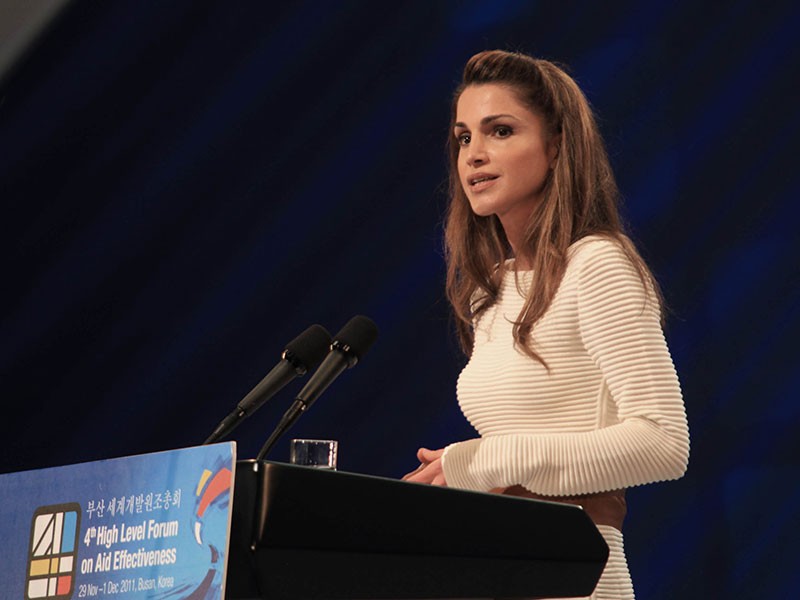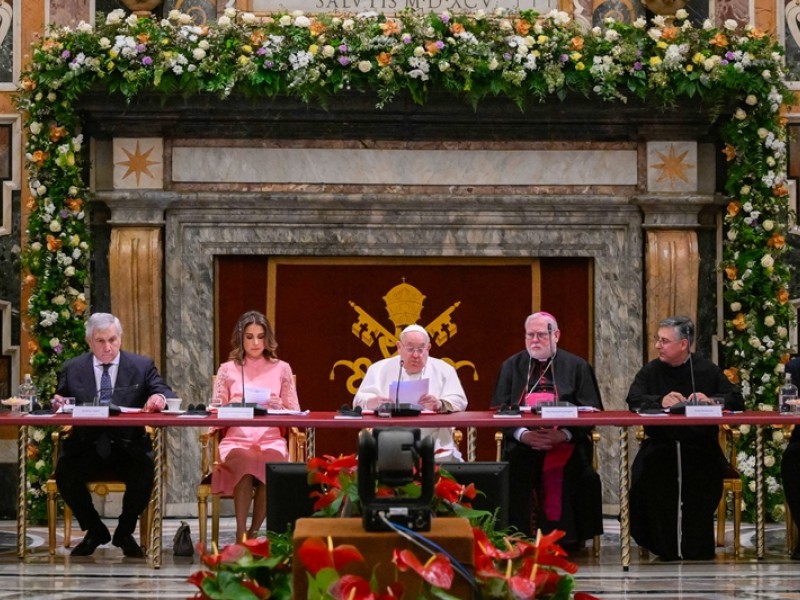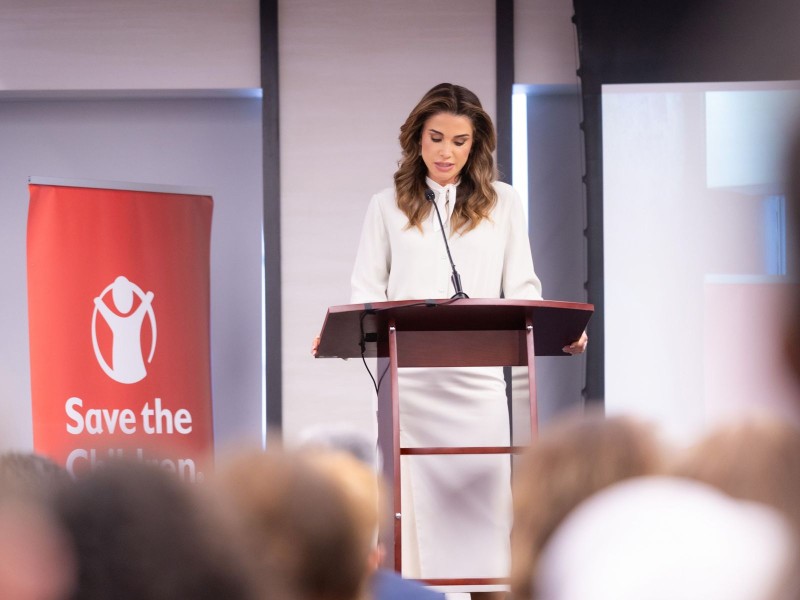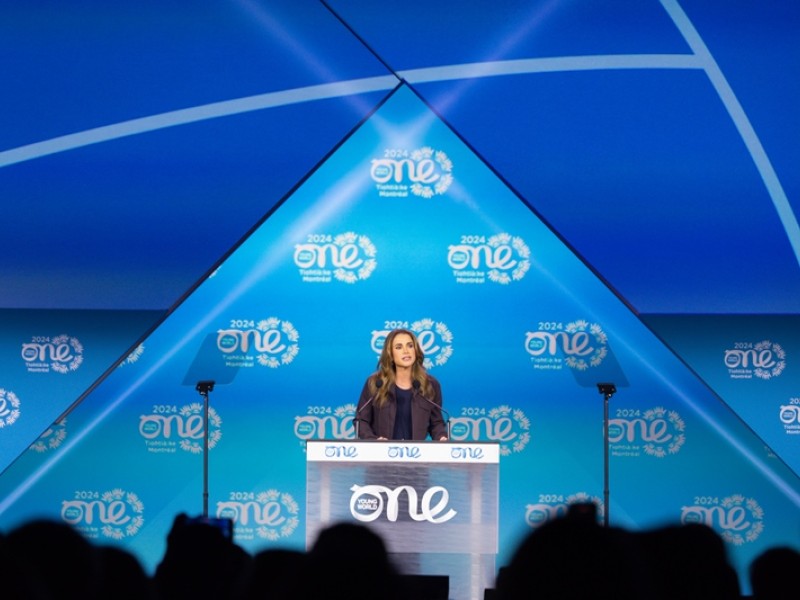Queen Rania's Speech at Fourth High Level Forum on Aid Effectiveness - Busan, South Korea
Dignity not Dependence; Equity not Exclusion

Thank you. It is a pleasure to join you all for this important meeting where expectations are high… and where the stakes have never… been… higher.
They’ve never been higher for the half of humanity surviving on $2 a day or less…or the 800 million people who live in slums.
For the 67 million children denied their right to an education…or the 770 million adults who cannot read or write.
And they’ve never been higher for the 21,000 children under 5 years old who die every single day of diseases we know how to cure.
I start my speech to you today with these daunting and desperate statistics not to remind you of the enormity of the challenge ahead. You already know that. But, rather, to remind us all that it is for these people that we have gathered here in Busan.
Because, too often, in meetings like this, politics can take precedence and the human dimension can get buried in the bureaucracy.
Going forward, let us remember our common humanity.
Busan, 2011 is very different to Accra, 2008 and very different to Paris, 2005. The world has changed a lot in the last six years. In fact, we are in a constant continuum of change which is altering the context for development.
On one hand, we are beset with economic downturns and record unemployment… struggling with food shortages, famine, and fuel crises. Hard fought development gains are slipping back.
On the other hand, we are witnessing massive shifts in global wealth and influence. Countries like Brazil, India, and China are enjoying near double digit growth… and are showcasing their new capacities as donors in south-south and triangular cooperation.
Several countries like Argentina, Malawi, and Malaysia have defied the global trend of inequality, and have narrowed the gap between the incomes of their poorest and wealthiest citizens. But they are the minority.
Because globally, inequality is rising. Crucially, it is rising in countries that are making progress towards the MDGs. It is rising in middle income countries experiencing rapid growth.
Consider the distribution of incomes globally. The 20 percent of the population with the highest incomes control 64–80 percent of all income; the poorest 20 percent have only 1–3 percent of all income.
The human costs are terrible too. Compared to children in the top 20 percent, a child born in the lowest 20 percent income group is twice as likely to die before reaching age five, three times more likely to be underweight, and less likely to attend school.
The Global Risks Report recently identified inequality as a major risk to global prosperity and stability…proving that as the world grows together, it is also growing apart.
As it does so, we should not be surprised that in the gaps created by disparities in wealth and opportunity… terrorism, corruption, disease, conflict, and hopelessness foment.
I need hardly remind anybody that it was inequality – with all its associated humiliations –that fuelled the discontent on the streets of Tunis and in Tahrir Square. It is what makes protesters occupy Wall Street and beyond.
Ladies and gentlemen, this is the backdrop to Busan. This is our new development context. And as the global landscape changes around us, it’s time for the global “aidscape” to change, too. We need a new development paradigm. One that is inclusive, sustainable, and mutually beneficial.
I am not saying that old partnerships, old methods of financing, and old aid models are obsolete. They are still a lifeline for many countries. What I am saying, is that they need to be adapted and edited for today’s narrative.
And there has never been a more exciting time to re-imagine development cooperation.
We have a dynamic new ecosystem of partners; countries whose successes we can all learn from. Like our hosts, South Korea, who, in the space of a generation, have engineered a miracle on the Han River, transforming from a country ravaged by war to a model of economic success that others can follow.
We have innovative mechanisms and models for funding: from private sector investment and diaspora reserves…to hybrid financing and corporate philanthropy.
We have extensive data to target those in need. And we have technology at our fingertips accelerating progress across all fields.
In the business world, the best ideas no longer come from the top down. They bubble from the bottom up…seep from the edge in. In development, this is also true. So we need a culture shift where governments switch from deciding development to facilitating it…from leading partners to convening them.
In 2009, the US private sector alone invested around $1.2 trillion in developing countries. If we give them space… businesses, NGOs, and engaged citizens will sign up as partners for progress.
It is an exciting time to be in the business of development! We have an opportunity to lift the lives of the most marginalized… and create a world that is more equitable.
If we’re going to be smart, the new aid era must be about equity.
It’s not about everyone having the same resources. It’s about giving everyone the opportunity to access the same resources.
Smart aid targets jobs.
Let me give you a very personal example. In the Middle East, we have the highest youth unemployment rate in the world. 60 percent of our population is under 25 years. 1 in 4 of them is unemployed. That is double the global average.
Arab youth don’t want aid money or short-term projects, they want jobs. They want to earn their salary; learn new skills. They want dignity not dependence.
Busan must do more to stimulate the conditions in which real jobs, sustainable jobs can grow. Like: increase access to banks, loans, and business advice. Like: create better opportunities for training and support government reforms for enterprise development. Like: dedicate more resources to creating small and medium enterprises.
Because aid is not just about eliminating poverty; it’s about creating prosperity. It’s not just about fewer famines and conflicts; it’s about peaceful and more prosperous neighbours.
Smart aid invests in children.
And that starts with a quality education for all.
Education is more than a right; it’s a resource. It can combat every global humanitarian challenge today. But 67 million children are shut out of school… there is a shortfall of 8 million teachers… curricula are out-dated… students graduate with yesterday’s skills.
And the majority of those out of school are girls. Girls! The best value for the development dollar there is.
Yet only 9 percent of ODA goes to education. It just doesn’t add up.
And smart aid prioritizes women.
Because they are 50 percent of our world and 40 percent of our workforce.
Because research shows that in the last twenty years, women have contributed more to global GDP than either new technologies or the emerging economies of China and India.
Because women in developing countries farm, produce, and sell more than half the world’s food. And when they’re not doing that, they’re cooking, childbearing, care-giving, finding fuel, carrying water. Women are at the forefront of our sustainable future.
But every day, around the world, they’re marginalized…stigmatized…and brutalized.
Ladies and gentlemen, everybody has a stake in global development; everybody has a part to play. Bob Zoellick said it well when he called for development to be ‘democratized’.
Inequalities serve nobody’s interests. In fact, high levels of inequalities actually impede economic progress. In countries where income is distributed more equally, there are longer-lasting spells of sustained growth.
Isn’t that our goal?
Isn’t the purpose of aid to end aid?
We can. And we must.
The only thing that is stopping us… is us.
Thank you very much.
Featured
Queen Rania's official website
This website does not support old browsers. To view this website, Please upgrade your browser to IE 9 or greater
Your browser is out of date. It has known security flaws and may not display all features of this and other websites. Learn how to update your browser



